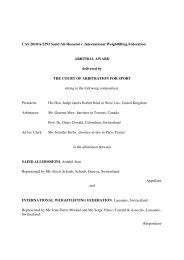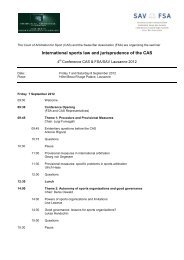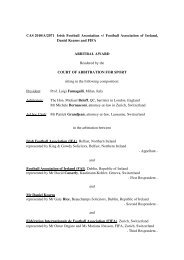(CAS) Bulletin - Tribunal Arbitral du Sport / TAS
(CAS) Bulletin - Tribunal Arbitral du Sport / TAS
(CAS) Bulletin - Tribunal Arbitral du Sport / TAS
You also want an ePaper? Increase the reach of your titles
YUMPU automatically turns print PDFs into web optimized ePapers that Google loves.
period of ineligibility (non-participation) that is<br />
not provided for under Article 10 of the WADA<br />
Code. In so doing, the IOC Regulation constitutes<br />
a substantive change to the WADA Code, which the<br />
IOC has contractually committed itself not to do and<br />
which is prohibited by Article 23.2.2 WADA Code.<br />
The purpose of Article 23.2.2 WADA Code is to<br />
ensure that Signatories do not intro<strong>du</strong>ce provisions<br />
that negate, contradict, or otherwise change the<br />
WADA Code articles that are mandatory, including<br />
the sanctions in Article 10. The Regulation is a<br />
substantive change to Article 10 because the period of<br />
ineligibility now becomes 2 years (or whatever lesser<br />
sanction in excess of 6 months is ordered) plus at least<br />
the number of days of the Olympic Games. The Regulation<br />
changes the effect of Article 10, through unilateral<br />
action by the IOC, by adding further ineligibility to<br />
the anti-doping sanction under the WADA Code<br />
after that sanction has been served.<br />
By virtue of imposing an additional consequence that<br />
is over and above the consequences that are already<br />
provided for in the WADA Code, the IOC Regulation<br />
is not in compliance with the WADA Code.<br />
In fi nding that the IOC Regulation is contrary to the<br />
WADA Code, the Panel wishes to make clear that it<br />
is not stating that the IOC Regulation could not be<br />
incorporated into the WADA Code or that the spirit<br />
or the rationale of the IOC regulation is per se right<br />
or wrong. If the IOC wants to exclude athletes who<br />
have been sanctioned for doping from the Olympics<br />
Games, it may propose an amendment to the WADA<br />
Code, which would allow other Signatories the time<br />
and opportunity to consider these issues and whether<br />
it should be adopted as provided in the Code. The<br />
Panel, of course, declines to comment on whether<br />
or how such an amendment should be enacted. It<br />
does note, however, that should the WADA Code be<br />
revised in this way, any issue of proportionality could<br />
be determined by the fi rst instance adjudicatory<br />
body and reviewed on appeal, which would likely<br />
satisfy any requirement of proportionality. Such an<br />
amendment would also likely make moot any issue of<br />
double jeopardy, since the sanction including a ban<br />
from an Olympic Games would be a single sanction<br />
as a result of an anti-doping violation, with the<br />
adjudicatory body taking into <strong>du</strong>e consideration the<br />
interplay of the two possible sanctioning elements.<br />
Similarly, issues regarding equal treatment and <strong>du</strong>e<br />
process would also be solved.<br />
1.2 Was the Rule enacted in compliance with the<br />
WADA Code Article 23.6?<br />
Given the above fi nding that the IOC Regulation<br />
is not in compliance with the WADA Code as it<br />
amounts to a substantive change to the sanctions<br />
provisions of the WADA Code, the Panel does not<br />
need to address this additional compliance argument<br />
in its Award.<br />
2. Olympic Charter<br />
Under Swiss law, private associations such as the IOC<br />
must act in compliance with Swiss law and applicable<br />
principles of law, as well as the association’s own<br />
statutes. Indeed, a member of an association may<br />
seek redress for acts and decisions of the association<br />
that are contrary to the law or to the statutes of the<br />
association (see article 75 CCS).<br />
In the present case, even though USOC is not a<br />
member of the IOC, the Panel is authorized to<br />
consider whether the IOC has acted in accordance<br />
with its statutes because the IOC agreed to arbitrate<br />
these issues with USOC. Following the desire of the<br />
parties to fi nally resolve the matters regarding to the<br />
validity and enforceability of the IOC Regulation, the<br />
Arbitration Agreement gives extensive powers to the<br />
Panel to resolve this dispute, including declaratory<br />
powers making it unnecessary for others to seek<br />
redress.<br />
Recognized by the Swiss federal Constitution and<br />
anchored in the Swiss law of private associations<br />
is the principle of autonomy, which provides an<br />
association with a very wide degree of self-suffi ciency<br />
and independence. The right to regulate and to<br />
determine its own affairs is considered essential for<br />
an association and is at the heart of the principle<br />
of autonomy. One of the expressions of private<br />
autonomy of associations is the competence to<br />
issue rules relating to their own governance, their<br />
membership and their own competitions. However,<br />
this autonomy is not absolute.<br />
The OC constitutes the IOC’s “Statutes ” within the<br />
meaning of the law on Swiss associations, pursuant to<br />
Article 60 of the CCS. That provision prescribes that<br />
the statutes must contain the necessary provisions<br />
as to the goal, the resources and the organisation<br />
of an association. The OC is the codifi cation of the<br />
Fundamental Principles of Olympism and, amongst<br />
other matters, governs the action and operation of<br />
the Olympic Movement.<br />
By Rule 44 of the OC, the IOC has incorporated<br />
the WADA Code into the IOC’s own Statutes. The<br />
IOC further provides in Rule 41 of the OC that a<br />
competitor must respect and comply with all aspects<br />
with the WADA Code. Accordingly, the IOC has by<br />
virtue of its own statutes and in particular, Rule 44,<br />
Jurisprudence majeure / Leading cases<br />
-<br />
148





